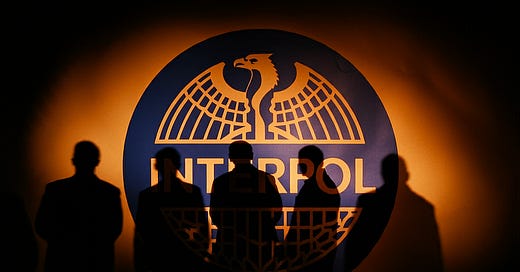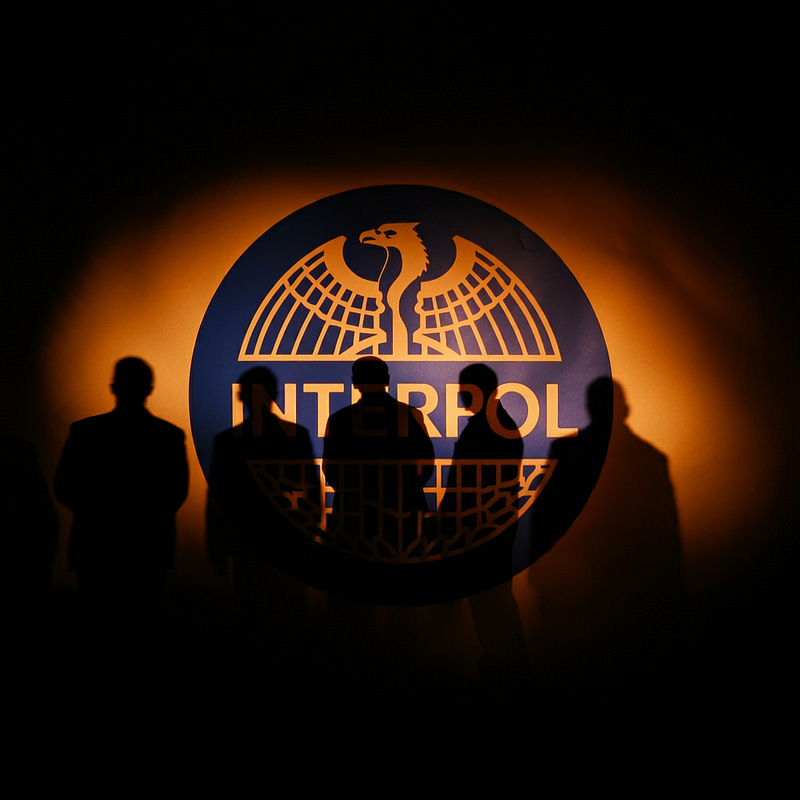The Clandestine Origins of INTERPOL: The Deep State’s Global Police Force
In the shadowy world of international law enforcement, few organizations wield as much power and influence as INTERPOL.
In the shadowy world of international law enforcement, few organizations wield as much power and influence as INTERPOL.
Today, this global policing behemoth operates in 194 countries, facilitating cross-border cooperation and information sharing on an unprecedented scale.
Recent high-profile cases, such as the arrest of former Nissan CEO Carlos Ghosn and the ongoing hunt for cryptocurrency fugitive Do Kwon, highlight INTERPOL’s far-reaching influence.
However, behind its polished facade lies a history shrouded in secrecy, diplomatic maneuvering, and questionable practices.
The Secretive Beginnings (1935)
The 1930s, a decade marked by global economic turmoil and the rise of totalitarian regimes, saw an unprecedented surge in international crime. Bootlegging, drug trafficking, and financial fraud flourished across borders, exposing the limitations of national police forces. It was against this backdrop that the International Criminal Police Commission (ICPC), INTERPOL’s predecessor, was born.
Recently declassified documents from 1935 shed light on the clandestine beginnings of what would become one of the world’s most powerful police networks. On April 17, 1935, as Europe teetered on the brink of another world war, the Austrian Minister sent a note to the U.S. Secretary of State, inviting the United States to designate delegates for the 11th regular meeting of the ICPC in Copenhagen, Denmark. This seemingly innocuous invitation masked a complex network of power players and diplomatic maneuvering that would shape the future of global policing.
Power Players and Diplomatic Maneuvering
At the heart of these revelations is the involvement of J. Edgar Hoover, the infamous director of the FBI. A memorandum dated May 4, 1935, from Justin Miller, Chairman of the Attorney General’s Advisory Committee on Crime, specifically mentions Hoover as “the most eligible appointee” to represent the United States at the ICPC meeting. Hoover’s potential involvement is particularly significant given his controversial legacy in American law enforcement. Known for his aggressive tactics, political maneuvering, and extensive surveillance programs, Hoover’s influence on the early days of international police cooperation raises troubling questions about the methods and priorities that may have shaped INTERPOL’s development.
Financial Opacity and Ethical Concerns
Perhaps most concerning are the financial arrangements surrounding the ICPC meeting. The documents repeatedly emphasize that delegates should attend “without expense to the government”. This cryptic phrase opens a Pandora’s box of ethical concerns. Who, then, was funding these international gatherings? The lack of financial transparency raises the specter of potential conflicts of interest and influence peddling at the highest levels of international law enforcement.
Historical parallels can be drawn to other instances of opaque funding in international organizations. For example, the League of Nations, established in the aftermath of World War I, faced criticism for its lack of financial transparency and reliance on private donations, which some argued compromised its neutrality and effectiveness.
Legal and Ethical Implications
As we analyze these historical documents, it becomes clear that several legal and ethical standards may have been compromised or overlooked in the formation of the ICPC. The lack of public accountability and transparency is glaringly evident. There appears to have been no mechanism for public oversight or input into the creation of this international police network. The potential for conflicts of interest looms large, with powerful figures like J. Edgar Hoover being suggested as representatives without clear guidelines for their roles or responsibilities.
The ethical concerns surrounding the use of diplomatic channels for police cooperation without public scrutiny cannot be overstated. This practice effectively created a shadow network of law enforcement operating outside the bounds of democratic oversight. The implications of these early practices for modern international law enforcement are profound and troubling.
The Evolution of a Global Police Network
As the ICPC evolved into INTERPOL, its reach and authority expanded exponentially. A timeline of key events in INTERPOL’s history reveals significant changes in its structure and operations:
1923: ICPC founded in Vienna
1938: Nazi Germany takes control of ICPC
1946: ICPC re-established after World War II
1956: ICPC becomes INTERPOL, adopting a new constitution
1989: INTERPOL General Secretariat moves to Lyon, France
2002: INTERPOL introduces a secure global police communications system
2018: INTERPOL launches its I-Core policing capabilities program
The re-establishment of the ICPC in 1946 was driven by the need to revive international police cooperation in the aftermath of World War II, with a focus on combating transnational crime and rebuilding trust among nations. This initiative was supported by various countries that recognized the importance of a coordinated approach to international crime.
Implications for Modern Policing and Civil Liberties
The potential for abuse of power within such a vast and opaque organization is a serious concern. INTERPOL’s Red Notice system, which allows member countries to request the arrest of individuals in other nations, has been criticized for being susceptible to political manipulation. Authoritarian regimes have been accused of using INTERPOL to harass dissidents and political opponents abroad, raising questions about the organization’s ability to maintain neutrality and protect human rights.
The implications of these early covert operations for modern policing and civil liberties are profound. The secretive beginnings of INTERPOL set a precedent for international law enforcement operating outside the bounds of public oversight. This legacy continues to shape the landscape of global policing today, with far-reaching consequences for privacy, individual rights, and democratic accountability.
One of the most pressing concerns is the potential for unchecked police power in the digital age. As INTERPOL expands its technological capabilities, including biometric databases and AI-powered surveillance systems, the risk of overreach and abuse grows exponentially. The lack of transparency surrounding these technologies and their deployment raises serious questions about privacy rights and the potential for mass surveillance on a global scale.
Moreover, the use of diplomatic channels for police cooperation, as evidenced in the 1935 documents, continues to blur the lines between law enforcement and foreign policy. This intertwining of policing and diplomacy creates a dangerous grey area where accountability becomes increasingly difficult to maintain.
Conclusion
The need for greater transparency and oversight in global law enforcement has never been more urgent. As INTERPOL’s influence continues to grow, so too must the mechanisms for holding it accountable. International bodies, civil society organizations, and national governments must work together to ensure that INTERPOL’s operations are subject to rigorous scrutiny and adhere to international human rights standards.
Specific reforms that could improve transparency and accountability in international policing include:
Establishing an independent oversight body to review INTERPOL’s operations and decisions
Implementing stricter criteria for issuing Red Notices to prevent abuse
Enhancing transparency in INTERPOL’s funding sources and financial operations
Creating a public reporting mechanism for alleged abuses of INTERPOL’s systems
Strengthening data protection measures and individual privacy rights
As we reflect on the hidden history of INTERPOL and its implications for modern policing, it becomes clear that a fundamental reevaluation of the organization’s structure and practices is necessary. The clandestine origins of this global police force, rooted in diplomatic secrecy and questionable financial arrangements, have cast a long shadow over its operations.
This investigation into the origins of INTERPOL is just the beginning. As we continue to uncover the truth behind this shadowy organization, one thing becomes clear: the need for vigilance in safeguarding civil liberties and democratic principles has never been more urgent. The legacy of INTERPOL’s clandestine beginnings serves as a stark reminder of the dangers of unchecked police power and the importance of transparency in all aspects of law enforcement, both domestic and international.
Source
Federal Bureau of Investigation. (1935). INTERPOL (International Police) [Declassified document]. File numbers: 62–20747 and 94–1–2061.
View the declassified file here on our Facebook group👇
https://www.facebook.com/groups/beyondinsightful/permalink/1670600943716515/





